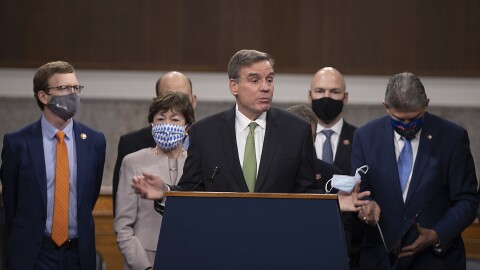The CDC recently extended its eviction moratorium until the end of March to keep people in their homes during the deadly COVID-19 pandemic. At a time when across the country are at-risk of being evicted, the protections in place are a welcome relief for some. But for small landlords who don't have much of a financial cushion, the moratorium could be disastrous.
Martin Walker is a 57-year-old Cincinnati man. He rents eight units in two homes. Many who know him would describe him as being a cool guy. He's lived on-and-off for decades in Over-the Rhine. Before COVID, he and his wife Takako Tsubohara used to go to the symphony Downtown. He collects 16 millimeter films and is the president of a local tobacco pipe club.
"We all we enjoy smoking pipes, and all the pipe tobacco and just all the paraphernalia and the different blends of tobacco and the different pipe manufacturers," he said.
Everyone in the club has a nickname. They call him Mr. President.
Walker and his wife both work full time at Toyota. He bought one building about 17 years ago and the other about a decade ago. He renovated them, figuring they'd be good retirement investments.
But the pandemic has changed that.
Walker says he initially let his tenants miss a few payments, especially the ones in the service industry, figuring they could make it up to him over the next year. But one of them, a bartender, couldn't make any payments and eventually moved out after not paying rent for roughly five months.
"He ended up owing me like $5,000 or something. And, you know, for a small guy like me, that's a lot — I got to pay property taxes and mortgages and utilities and all that sort of thing. So it's been painful," he said.
In addition to the bartender, another tenant moved out. It's the first time Walker has had long-term vacancies in his apartments.
He's had to lower rent in apartments to try to get them occupied. He planned to retire last May, but had to push that off for another year or two. And he's thinking about selling a small house he and his wife own in Sylvania, about three hours away.
But Walker still considers himself lucky. Since he and his wife work full-time, they're not forced to sell or foreclose.
Just under half of all landlords in the country are considered these type of mom-and-pop landlords, meaning they only own a few units. And while the government allocated tax breaks and trillions of dollars for landlords in the CARES Act, small landlords were mostly left out to qualify for those.
That has a real impact.
of homeowners will have soon and may be forced to foreclose on their homes.
Kevin Brewer is a local attorney who represents landlords. He doesn't represent Walker but confirmed that the struggles landlords are facing because of the moratorium are real.
"You can imagine, if you're a small landlord, what kind of financial situation that could put a landlord in," he said. "As I mentioned, they might put off doing repairs, they might not be able to make their own mortgage payments, which could lead to foreclosure."
But that's just one perspective. Mark Lawson, president and CEO at the Cincinnati-Hamilton County Community Action Agency, reminds people rental assistance is landlord assistance.
"I think from a policy perspective, we're helping the landlords. Not necessarily their mortgage payments, but if we get everybody, all their tenants to be able to pay the rent, and get caught up ... because for the Ohio Home Relief grant money, there's no cap on how much assistance we could get," he said. "So you know, we could pay back all the way until April 1. So that is huge for tenants and huge for landlords."
The CAA doles out rental assistance in Cincinnati. Lawson says so many people have applied for help, there's about a 2,000-person backlog and not enough workers to quickly get through applications. There's still millions of dollars left on the table right now for rental and utility assistance.
"So there's plenty of assistance out there. And so that coupled with the idea of 2,000 people in our pipeline, to me, that means let's not evict somebody while they're waiting just to get in line with us," he said.
Lawson says the organization has spent a little more than $5 million on rental and utility assistance and still has about $11 million dollars left to help people.
Rental assistance information can be found at the
Copyright 2021 91.7 WVXU. To see more, visit . 9(MDA5NTM4MTIyMDE0MTg3NDc2MTVlZjdmNQ001))





